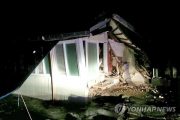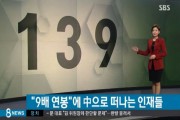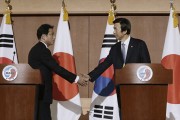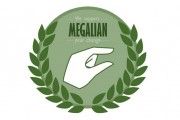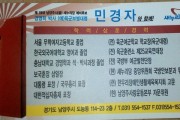South Koreans and Japanese have reacted with shock and protest to news that Japanese peace-keeping troops in South Sudan provided ammunition to Korean peacekeepers in mid-December. A deputy commander of the South Korean unit made the ammunition request following an escalation in armed conflict in South Sudan. Although the ammunition was provided via a legitimate U.N. procedure and cooperation between peace-keeping units is not unusual, not only Koreans but also Japanese have protested, as the ammunition delivery may have violated Japanese arms export prohibitions. The delivery became more controversial following Prime Minister Shinzo Abe’s December 26th visit to the Yasukuni Shrine.
Korean netizens were particular critical of the South Korea government for actions which seem to encourage Japan to reverse its pacifist policies.
Article from Yonhap News:
Self Defense Force’s Ammunition Provision to South Korea’s Peace-keeping Unit in South Sudan Leads to Controversy in Japan
Opposition leaders and NGOs in Japan call providing ammunition to South Korea peace-keeping (PKO) unit in South Sudan a violation of long-cherished ban on exporting arms.
On December 13th, a Japanese Self Defense unit stationed in South Sudan provided ammunition to a South Korean military unit deployed nearby, stirring up a controversy in Japan over its legitimacy.
At the center of the controversy lies the suspicion that Shinzo Abe’s conservative government is trying to strike down Japan’s three principles on arm exports.
[Note: Three principles on arms exportation Japan proclaimed in 1967 prohibit weapons exports to the following states: (1) a communist state; (2) a state for which a U.N. resolution prohibits arms exports; (3) a state which is a party to an international conflict or or is likely to be such a party. In 1976, Japan stated that it will refrain from shipping arms to all states and regions, effectively suggesting a blanket ban on exporting arms. But the self-imposed restriction is not legally binding, so there is a possibility that Japan would reverse its police. Indications of this ominous prospect emerged in December 2011 when Japan announced a partial relaxation of the restraint.]
In a bid to calm the controversy, the Japanese government explained that the ammunition provision was made taking into consideration urgency and humanitarian necessity in the African nation, but the Japanese public appears not to be persuaded.
The spokesman for the Japanese government, Yoshihide Suga, said in a December 24th press briefing that the provision took place because South Korean troops were low on ammunition. Japanese media responded with accusations that the Japanese government was exaggerating the severity of the situation.
The suspicion intensified when a spokesman for South Korea’s Ministry of Defense, Kim Min-seok, said, “The Hanbit [ROK army] unit has sufficient ammunition for self defense, but secured additional provisions as a contingency for future conflict.”
The Japanese government claimed the situation was urgent enough for the South Korean government to make a direct request.
Cabinet Secretary Suga said, “The Japanese government received an official request from the United Nations, and South Korea also made such a request. All of these are the truth.”
According to Kyodo News, a Japanese Self Defense Force commander dispatched to South Sudan confirmed on December 24th that the deputy commander of the deployed South Korean unit, Col. Go Dong-jun, called him to request ammunition provision for the South Korean unit on December 21st.
Despite the Japanese government’s explanation, the ripple effects of the controversy are spreading.
The Japanese government maintains a position that it does not supply military ordinance to peacekeeping operations of the United Nations, a rule that was breached by the ammunition supply to the South Korea PKO unit in the war-torn African country.
In 1992, when a PKO cooperation bill was deliberated in the Diet, Japan’s parliament, the Japanese government said that logistical cooperation articles in the bill exclude the provision of arms and ammunition and that Japan would refuse any such request, even if it were to come from a U.N. chief.
Rep. Matsubara Jin of Democratic Party of Japan(DPj) called for a parliamentary probe despite the fact that the Diet is currently out of session, saying, “It is questionable whether the ammunition provision is in line with three principles on arms export,” hinting at a political offensive against the ruling Liberal Democratic party (LDP).
He added, “Changing the rule without parliamentary approval is impermissible. That kind of alteration could be a significant turning point, before taking action we need to clarify what happened in South Sudan to the Japanese public.
The Secretary General of the Social Democratic Party (SDP) Mataichi Seiichi said, “Although urgency exists on the ground in South Sudan, (the ammunition supply decision) involves national principles. The latest move is an outrageous act that shakes Japanese democracy to the core,”
Non-government organizations have joined the opposition party in criticizing the latest move.
Seike Hirohisa, who works with a famine relief organization operating in South Sudan, said, “If Japan is found to have used ammunition in South Sudan, it would put the Japanese personnel working there in danger. The latest decision is a matter that should be determined by parliamentary discussion, not by a cabinet meeting.”
Comments from Naver:
jeff****:
It is a shame that we haven’t dug out the pro-Japanese collaborators from our country.
pops****:
The receipt of ammunition from the SDF unit in South Sudan will help Japan achieve its long-held wish. South Korea has been caught red-handed helping Japan to break the principles on arms exports which have existed since the end of WWII.
ab12****:
Japs will revive militarism and rearm themselves sooner or later. In the next two or three decades, they will threaten South Korea to open the way for Japan’s overland advancement into mainland China, and use it as an excuse to invade South Korea. We need to turn our nation into a military power by increasing defense spending.
ki3u****:
It looks like South Korea played into Japan’s hands, it feels like we were caught in their schemes. We are trying to play down the importance of the ammunition provision, but Japan sounds condescending.
nugu****:
There are about 50 countries whose PKO units in South Sudan use the NATO standard of 5.56 mm bullets, including the United States, Japan, Canada, Denmark, Germany, Italy, New Zealand, Norway and so on. Why in the hell did borrow the ammunition from Japan?
udu1****:
NATO troops use 5.56 or 7.62mm bullets because allied troops can share the ammunition in emergency situations, and it is more efficient. Please, don’t blow the South Korea-Japan ammunition sharing in South Sudan out of proportion. I don’t feel bad that the ammunition came from Japan’s SDF. It is more shameful that Korea failed to deal with pro-Japanese collaborators after the peninsula was liberated from Japan.
celc****:
By the way, was there any emergency situation that prompted the Hanbit unit to use ammunition in its operation area? To be honest, 10,000 rounds of ammunition is perhaps equivalent to five or six bullet boxes. I don’t understand why the South Korean unit there requested and received such a small amount of ammunition from Japan via the UN. It could have been supplied by air from South Korea in a day. It couldn’t have been because of saving the fuel cost for a cargo aircraft. I wonder how urgent the situation was.
ddli****:
The last thing Israel want is assistance from neighboring Muslims. That kind of thinking is scary. I can’t figure out why some bastards would bullshit as if now Japan is an ally to South Korea less than a century after the Korean peninsula was annexed and liberated from their dominance? Those bastards are spineless.

Hanbit troops, a U.N.-mandated South Korean peacekeeping unit for South Sudan, salute in a ceremony before deployment.
Comments from Daum:
구라치네:
Was the huge defense budget spent on posting Internet comments? How come they stooped down to a situation where they had to get ammunition from Japan’s SDF? Korea, how pathetic!
술도가니:
Government officials, you seem to fare well giving a hand to Japan in building itself into a military power. As a citizen reading this article, I don’t “feel okay”.
옥상방수:
Well, it looks like the South Korean troops at least carried their rifles to South Sudan? What a shame for the soldiers who borrowed ammunition. Many senior government officials evaded the mandatory military service, so they might have mistaken the PKO operation for a picnic. What a shame!
커피:
After everything that happened under colonial rule, South Korea helps Japan open a new chapter for militarization.
둥이파파
The South Korean unit should have requested ammunition from American troops there instead. Why Japan? The pro-Japanese Korean government makes it too obvious. Why beg Japan for ammunition? Freaking idiots.
김문겸
I think the problem is more with South Korea than with Japan. South Korea has talked about the problem of a possible resurrection of Japan’s militarism, but ironically, they borrowed ammunition from Japan’s SDF. Does it make any sense? Has the rambling on about Japanese militarism been just empty rhetoric?
